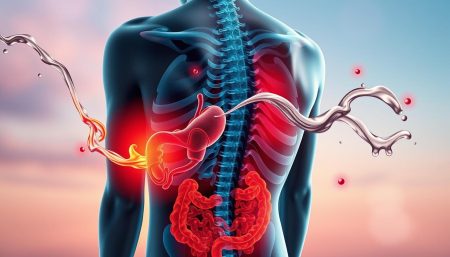Acid reflux made everyday life hard. I needed a real fix, not just a quick band-aid. I learned that a holistic approach to acid reflux was key. This led me to find natural solutions that really worked.
This journey changed how I live, not just how I manage acid reflux. I want to help others know they don’t have to live with pain. A successful acid reflux remedy is about diet, lifestyle, and caring for yourself. Let me show you how I found a natural solution to say goodbye to acid reflux.
Key Takeaways
- Acid reflux can be managed effectively with a holistic approach.
- A thorough natural solution for acid reflux often includes dietary and lifestyle changes.
- Patient commitment to a healthier lifestyle is crucial for a successful remedy.
- Integration of natural remedies provides lasting relief and wellness benefits.
- Adopting a patient and nurturing perspective is key to overcoming acid reflux challenges.
Understanding Acid Reflux and Its Common Triggers
Acid reflux disease is a common digestive problem. It causes discomfort and can lead to serious health issues if not treated. Knowing what triggers acid reflux is key to finding natural ways to manage it.
The Basics of Acid Reflux Disease
Acid reflux disease, also known as gastroesophageal reflux disease (GERD), happens when stomach acid flows back into the esophagus. This can irritate the esophagus lining, causing heartburn, regurgitation, and trouble swallowing.
Identifying Your Acid Reflux Triggers
Many things can trigger acid reflux, like what you eat, how you live, and some health conditions. Knowing these triggers is crucial for managing acid reflux. Here are some common ones:
- Fatty and spicy foods
- Citrus fruits, chocolates, caffeine, and carbonated drinks
- Eating too much or too close to bedtime
- Stress and anxiety
- Being overweight and some medications
It’s important to know how your lifestyle and diet affect acid reflux. Natural remedies often involve changing your diet and lifestyle to avoid these triggers.
| Trigger | Recommended Modification |
|---|---|
| Fatty Foods | Limit intake and choose leaner protein sources |
| Spicy Foods | Reduce spice level and monitor reactions |
| Meal Timing | Avoid eating less than three hours before bedtime |
| Stress | Incorporate relaxation techniques |
Everyone reacts differently to these triggers. Keeping a diary of your diet and symptoms is helpful. It can show you what triggers your acid reflux and what changes work best for you.
My Journey to Finding a Natural Cure for Acid Reflux
My personal acid reflux story started with constant discomfort and failed treatments. But then, I found natural acid reflux treatment at home. This change not only brought relief but also let me control my health with successful acid reflux remedies from nature.
I tried many home remedies and found lots of positive stories. It was important to keep an open mind and focus on overall health. Writing about my journey helped me connect with others facing similar health issues.
- Adjustments in diet
- Herbal supplements
- Stress-reduction techniques
Every remedy I tried helped me understand what my body needed to heal. These changes weren’t just about fixing symptoms. They were big steps towards a healthier lifestyle.
My success isn’t just about not having acid reflux anymore. It’s about feeling alive and well again. By sharing my personal acid reflux story, I hope to inspire others. I want to show them that natural acid reflux treatment at home can work for them too.
Key Elements of a Successful Natural Acid Reflux Treatment
Starting to fight acid reflux means knowing the key parts of successful acid reflux remedies. Quick fixes help, but lasting relief comes from consistency in natural treatments and sticking to long-term lifestyle changes acid reflux needs.
Importance of Consistency in Natural Treatments
Keeping up with natural remedies, like diet changes and herbal supplements, does more than just ease symptoms. It changes your body’s digestive setup for the better. Learning about this from an article on heartburn remedies shows how crucial consistent practices are.
Lifestyle vs. Instant Solutions: A Long-Term Outlook
Quick fixes might seem appealing, but long-term lifestyle changes acid reflux patients need are more important. Changing how you eat, exercising right, and managing stress are not just tweaks. They are the base for lasting health. These changes might take time and effort, but they lead to better health overall.
How I Cured My Acid Reflux
Looking back, curing my acid reflux was a mix of diet changes and lifestyle tweaks. I made choices that helped soothe my discomfort and fixed my digestive health.
Diet adjustments for acid reflux were key. I learned which foods and drinks made my symptoms worse. I then avoided them and added foods that helped my gut.
Here are the diet changes that helped me the most:
| Food Types | Remove | Add |
|---|---|---|
| Fruits | Citrus fruits like oranges and grapefruits | Bananas, melons, and apples |
| Beverages | Caffeine, alcohol, carbonated drinks | Herbal teas, alkaline water |
| Fats & Oils | High-fat foods and fried items | Avocados, nuts, and olive oil |
| Grains | Refined grains like white bread and pasta | Whole grains such as brown rice and oats |
Along with diet changes, tips for managing acid reflux included eating smaller meals and skipping late-night snacks. These habits greatly reduced my symptoms.
These changes, though slow, made a big difference. By changing my diet and lifestyle, I got rid of my acid reflux symptoms and felt better.

The Role of Diet Adjustments in Controlling Acid Reflux
Learning how to adjust your diet for acid reflux is key. It’s not just about cutting out foods. It’s about choosing foods that help keep your esophagus healthy.
Acid Reflux Diet Plan Basics
A good acid reflux diet plan avoids acidic, spicy, and fatty foods. These can make symptoms worse. Instead, focus on alkaline foods that balance stomach acids. Also, eat foods high in fiber to help digestion and prevent too much stomach acid.
Recommended Foods and Foods to Avoid
It’s important to know which foods are good and which to avoid for acid reflux.
| Foods to Include | Foods to Avoid |
|---|---|
| Ginger | Tomatoes |
| Oatmeal | Onions |
| Green vegetables (e.g., broccoli, asparagus) | Chocolate |
| Non-citrus fruits (e.g., melons, bananas) | Coffee |
| Lean meats (e.g., turkey, chicken breast) | Fried foods |
Adding these diet changes to your meals can help a lot. The acid reflux diet plan not only eases digestion. It also boosts your overall health, leading to a more energetic life without digestive problems.
Implementing Lifestyle Changes to Alleviate Acid Reflux Symptoms
Many people with acid reflux find relief through lifestyle changes. Focusing on stress management for digestion and regular physical activity is key.
Stress Management and its Impact on Digestion
Stress can make acid reflux worse. Using stress-reducing methods can help digestion and cut down on acid reflux. Try deep breathing, meditation, or hobbies to relax and improve your digestion.
The Importance of Physical Activity
Adding physical activity acid reflux management to your routine is beneficial. It helps keep your weight in check and strengthens your digestive system. Activities like walking, yoga, and jogging boost your health and reduce acid reflux.
| Activity | Benefits | Frequency Recommended |
|---|---|---|
| Walking | Improves digestion, manages weight | 30 minutes daily |
| Yoga | Reduces stress, strengthens the core | 3-4 times weekly |
| Light Jogging | Increases stamina, supports digestive health | 20-30 minutes, 3 times weekly |
By making these lifestyle changes acid reflux symptoms can be better managed. It’s wise to talk to a healthcare professional to make sure these activities fit your health and abilities.

Complementary Natural Remedies for Acid Reflux
Looking into non-pharmaceutical options, like homeopathic remedies and herbal supplements, shows a wealth of gentle yet effective solutions. These natural remedies are loved for their low side effects and how they work with the body’s healing.
Herbal Supplements That Soothe the Gut
Herbal supplements for digestion are becoming key in managing acid reflux. Ingredients like ginger, licorice, and slippery elm are known for soothing the stomach. They help calm an upset esophagus and support the gut’s health.
Homeopathic Remedies and Their Effectiveness
In the world of homeopathic remedies for acid reflux, Nux vomica and Carbo vegetabilis are often suggested. These remedies are praised for easing symptoms like heartburn and indigestion. They help balance the digestive system.
| Herbal Supplement | Benefits | Homeopathic Remedy | Symptom Target |
|---|---|---|---|
| Ginger | Reduces inflammation, soothes stomach | Nux Vomica | Heartburn, bloating |
| Licorice | Forms protective layer in the stomach | Carbo Vegetabilis | Acidity, indigestion |
| Slippery Elm | Coats the esophagus, reduces irritation | Pulsatilla | Indigestion, upset stomach |
How Mindfulness and Meditation Can Support Digestive Health
Exploring the mind-gut connection shows us how mindfulness for digestive health can greatly improve our well-being. This approach doesn’t just treat symptoms. It also tackles the root causes of digestive issues like acid reflux.
Recent studies highlight the effectiveness of meditation and acid reflux management. Meditation helps relax the body, reducing stress that worsens digestive problems. By focusing on breathing and mindfulness, people can create a better environment for digestion. This leads to fewer acid reflux episodes.
A holistic approach to acid reflux goes beyond just changing what we eat. It includes practices that calm both mind and body. Mindfulness and meditation are key, offering benefits that prevent and cure. These practices help manage stress and discomfort, improving digestive health.
Regular meditation sessions have been shown to reduce acid reflux symptoms. This suggests a direct benefit from adding these practices to daily routines for those with digestive issues.
- Stress Reduction: Meditation helps manage stress, a big trigger for acid reflux.
- Improved Digestion: Mindfulness makes eating more mindful, which can help digestion.
- Better Sleep: Better relaxation and relief from acid reflux symptoms lead to better sleep. This improves digestive health further.
This integrated approach not only lessens acid reflux symptoms. It also leads to a more balanced and health-focused lifestyle. Through mindfulness and meditation, people can take control of their digestive health. This results in better well-being and quality of life.

Personal Tips for Managing Acid Reflux from My Experience
Managing acid reflux well needs personal insight and a readiness to change your lifestyle. I’ve found several important practices that help control symptoms and improve digestion.
Building Healthy Routines and Habits
Creating a healthy routine acid reflux sufferers can follow is key. This routine should include regular meals, easy-to-digest portions, and chosen foods. Drinking enough water and staying upright for 45 minutes after eating are also important. These habits not only reduce acid reflux but also boost overall health.
Tracking Symptoms and Dietary Reactions
For good acid reflux management, tracking symptoms acid reflux patients feel is vital. Keeping a diary of meals, symptoms, and their intensity is helpful. This tracking helps spot triggers and patterns, making it easier to adjust your diet and lifestyle.
- Avoiding late meals which might trigger nighttime reflux
- Incorporating gentle exercises to improve digestion
- Limiting foods that are high in fat, sugar, and salt
Adapting managing acid reflux tips to adult life can greatly improve your quality of life. It’s about finding a balance that meets your needs while being aware of your body’s responses.
Conclusion
In this article, we explored how to manage acid reflux with a holistic approach acid reflux. We covered understanding the condition and using natural acid reflux treatment at home. The journey we shared offers hope for those looking for relief.
Changing your lifestyle is key to managing acid reflux. It’s the foundation for lasting wellness. This is crucial for anyone looking to improve their health.
While quick fixes are helpful, lasting progress comes from a holistic approach. This includes diet, exercise, and managing stress. Our goal was to share medical insights in a way that feels personal and relatable.
By adopting these methods, you can improve your health. This journey is about taking care of yourself and living a better life. It’s about finding ways to heal and feel better.
The medical field is always learning and growing. But, the importance of taking care of yourself remains the same. Starting this journey can greatly improve your life and reduce acid reflux discomfort.
FAQ
Q: What is acid reflux and what are its common triggers?
A: Acid reflux, also known as gastroesophageal reflux disease (GERD), is when stomach acid flows back into the esophagus. This can cause discomfort and damage. Common triggers include foods like spicy or fatty items, caffeine, and alcohol. Lifestyle factors like stress, obesity, and lying down after eating also play a role.
Q: Can a natural solution effectively cure acid reflux?
A: Many people have found natural ways to manage or cure acid reflux. A holistic approach includes diet changes, lifestyle adjustments, and herbal remedies. But, what works for one person might not work for another.
Q: What are some natural remedies for acid reflux?
A: Natural remedies include herbal supplements like ginger, chamomile, or slippery elm. These can soothe the digestive tract. Others find relief with apple cider vinegar, baking soda, or aloe vera juice. Always talk to a healthcare provider before trying new remedies.
Q: What lifestyle changes can help alleviate acid reflux symptoms?
A: Making lifestyle changes can help. Losing weight if needed, eating smaller meals, and avoiding food before bed are good steps. Elevating the head during sleep and reducing stress through mindfulness or meditation also help. Increasing physical activity can improve digestion and reduce stress, helping control acid reflux.
Q: How might stress management and exercise affect acid reflux?
A: Stress can worsen acid reflux symptoms. Exercise helps maintain a healthy weight and aids digestion. It also reduces stress, improving overall control of acid reflux.
Q: Are there specific foods that should be included or avoided in an acid reflux diet plan?
A: Yes, an acid reflux diet plan includes foods less likely to cause reflux. Lean meats, non-citrus fruits, vegetables, oatmeal, and certain grains are good. Avoid high-fat foods, spicy foods, chocolate, caffeine, onions, mint, and acidic fruits and vegetables. Also, carbonated beverages are best avoided.
Q: What does a successful natural acid reflux treatment entail?
A: A successful natural treatment for acid reflux combines dietary changes, lifestyle modifications, and herbal remedies. It requires consistent effort and focuses on long-term changes rather than quick fixes.
Q: How can mindfulness and meditation support individuals with acid reflux?
A: Mindfulness and meditation can reduce stress and promote a calm mind. This can lessen acid reflux episodes. These practices improve overall health and enhance gut-brain communication.
Q: Can keeping a food and symptom diary help manage acid reflux?
A: Absolutely. Tracking foods and symptoms can identify triggers. This knowledge helps make better dietary and lifestyle choices, reducing discomfort.
Q: Is it possible to cure acid reflux without medication?
A: While not everyone can cure acid reflux without medication, many manage symptoms naturally. Natural remedies, diet, and lifestyle changes can help. Always consult a healthcare provider for the best approach.


















